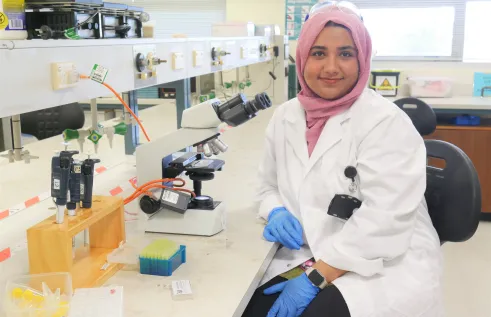Key details
Duration
Locations
Entry requirements
View full entry requirementsCredit points required
80Course code
Overview
This one-year honours course includes a major research project, advanced-level coursework and research skills training in a number of science disciplines, including:
- environmental science
- health and clinical science
- information technology.
Key areas you could base your research on include:
- biology
- ecology
- hydrological science
- spatial science
- analytical chemistry and molecular modelling
- exercise and sports science
- medical laboratory science
- pharmacy
- information systems
- mobile networking
- software development.
Honours qualifications prepare you for professional positions requiring higher-level project management, effective written and oral communication, analysis, and problem-solving and research skills. You are encouraged to pursue in-depth research under the guidance of experienced researchers and through targeted coursework and generic research skills training.
Honours qualifications are also a pathway to further study in Master or PhD programs.
Career opportunities
Graduating from this course may lead to career opportunities in the industry, government, private and the community sector as a biologist, ecologist, spatial scientist, biomedical scientist, chemist, consultant, laboratory assistant, academic, project manager or advisor.
Fees
Commonwealth supported places
Commonwealth Supported places are available in this course to students who meet one of the following residency requirements:
(a) be an Australian citizen, who will complete some of your course of study while resident in Australia; or
(b) a New Zealand citizen; or an Australian permanent visa holder; or an eligible former permanent humanitarian visa holder; who studies the entire course while living in Australia.
Further information about fees and charges can be found at Fees and Payments.
International tuition fees
The annual tuition fee for full time study in 2026 is AUD $38,048.00. This equates to $4,756.00 per 10 credit point unit (0.125 EFTSL).
These fees are subject to increases annually, effective at the start of each calendar year.
You can find a list of International fees and payments you can expect to pay as part of your studies in Australia. See 2026 Higher Education International Annual Tuition Fees.
CDU offers a number of scholarships to international students to assist with the cost of study.

Why study Science, Environmental Science and Management at CDU?
If you're interested in finding solutions to our planet's environmental issues, there's never been a better time to study science, environmental science and management at CDU. You'll be prepared to apply the academic theories and principles you learn in class to real-world problems in a diverse range of careers.
- #3 in Australia for agriculture and environmental studies starting salary (GUG 2024)
- Five-star Australian university for graduate employment outcomes (GUG 2024)
- Choose to study online, on campus, part-time or full-time as it suits you

Why study science, environmental science & management at CDU?
If you're interested in finding solutions to our planet's environmental issues, there's never been a better time to study science, environmental science and management at CDU. You'll be prepared to apply the academic theories and principles you learn in class to real-world problems in a diverse range of careers.
- Five-star Australian university for undergraduate employment outcomes (GUG 2024)
- #3 in Australia for agriculture and environmental studies starting salary (GUG 2024)

Why study Science, Environmental Science and Management at CDU?
If you're interested in finding solutions to our planet's environmental issues, there's never been a better time to study science, environmental science and management at CDU. You'll be prepared to apply the academic theories and principles you learn in class to real-world problems in a diverse range of careers.
- #3 in Australia for agriculture and environmental studies starting salary (GUG 2024)
- Five-star Australian university for graduate employment outcomes (GUG 2024)
- Choose to study online, on campus, part-time or full-time as it suits you

Why study science, environmental science & management at CDU?
If you're interested in finding solutions to our planet's environmental issues, there's never been a better time to study science, environmental science and management at CDU. You'll be prepared to apply the academic theories and principles you learn in class to real-world problems in a diverse range of careers.
- Five-star Australian university for undergraduate employment outcomes (GUG 2024)
- #3 in Australia for agriculture and environmental studies starting salary (GUG 2024)
What will I study?
The Bachelor of Science Honours consists of a major research project, a research skills unit, and elective coursework units relevant to the discipline and training activities (hurdle assessments) individually selected to meet your specific needs.
Course structure
A candidate must successfully complete units totalling 80 credit points (cp) as detailed below. All units are valued at 10 credit points unless otherwise indicated.
| Unit type | Credit Points | Specific requirements |
| Core Units (1 unit) | 10cp | Compulsory Core unit totalling 10 credit points as detailed below: SID403 Research Skills |
| Research Units (6 units) | 60cp | Research units totalling 60 credit points selected from the units listed below: SCI701 Honours Thesis A SCI702 Honours Thesis B SCI703 Honours Thesis C SCI704 Honours Thesis D SCI705 Honours Thesis E (requires prerequisites SCI701 and SCI702) SCI706 Honours Thesis F (requires prerequisites SCI701 and SCI702) |
| Specialist Electives (1 unit) | 10cp | Specialist Elective unit totalling 10 credit points (at 400 or 500 level) selected from the units listed below: ENV511 Real-World Statistics and Data Reasonings OR another research preparation unit approved by the course coordinator. |
| 80cp | Total Credit Points |
Course Rules (unless otherwise indicated in the above course structure)
- See the Higher Education Course Rules (Award Requirements) in the Units and Courses Policy.
COURSE CHANGES AND TRANSITIONAL ARRANGEMENTS - 2025
From 2025, the course structure has changed as follows:
- Six (6) new Research units have replaced the below Research units to provide students with greater flexibility
- SCI711 Honours Thesis #10 (10 credit points) (final offering 2024)
- SCI712 Honours Thesis #20 (20 credit points) (final offering 2024)
- SCI713 Honours Thesis #30 (30 credit points) (final offering 2024)
- The Information Technology and Health and Clinical Sciences specialisations have been removed as specified options from the Specialist Elective section.
List of units removed as specified options
Health and Clinical Sciences:
HEA562 Practice Evaluation Strategies (no longer offered)
PHM519 Clinical Trials and Other Intervention Studies (replaces PHM524 from 2021)
PHM526 Research Design
PHM527 Research, Ethics and Impact
PHM552 Epidemiology
PHM553 Biostatistics
PHM588 Qualitative Research
PSY416 Ethics and Professional Issues (replaces PSY426 2022)
PSY417 Research Methods and Practice (replaces PSY447 2022)
Information Technology:
Unit approved by the project thesis supervisor and honours coordinator.
- HEA562 Practice Evaluation Strategies has been removed from the Health and Clinical Sciences specialisation in the Specialist Electives.
Transitional arrangements
- Students that have completed SCI711, SCI712 or SCI713 prior to 2025 will have these counted towards their Research unit requirements.
- Students that have completed SCI711, SCI712 or SCI713 prior to 2025 will be contacted by their Course Coordinator to discuss their enrolment options.
- Students who have completed a specialist elective prior to 2025 will have this counted towards their Specialist Elective requirements.
Any student who believes they will be disadvantaged by these changes should contact the course coordinator for assistance.
COURSE CHANGES AND TRANSITIONAL ARRANGEMENTS - 2022
PSY426 has been replaced by PSY416. Students that have completed PSY426 prior to 2022 should not complete PSY416.
PSY447 has been replaced by PSY447. Students that have completed PSY447 prior to 2022 should not complete PSY417.
Study plan
STUDENTS COMMENCING IN SEMESTER 1
The Recommended Study Plans provided below are suitable for students enrolling in a full-time or part-time study load. Students entering this course with advanced standing, or wishing to vary their study plan due to work, personal, financial or other reasons should use the table as a guide to create an individual study plan.
When designing an individual study plan:
- maintain the basic order in which units are to be attempted; and
- check the prerequisite and assumed knowledge for each unit as some units assume you have completed foundation unit/s in the unit area at a lower level.
| Legend: | CO = Core Unit | R = Research | SE = Specialist Elective |
Full-Time Study Plan
| Semester 1 | Semester 2 | ||
| Year 1 | |||
| SID403 Research Skills | CO | SCI703 Honours Thesis C | R |
| Specialist Elective (discipline-specific research preparation unit) | SE | SCI704 Honours Thesis D | R |
| SCI701 Honours Thesis A | R | SCI705 Honours Thesis E (prerequisites: SCI701 and SCI702) | R |
| SCI702 Honours Thesis B | R | SCI706 Honours Thesis F (prerequisites: SCI701 and SCI702) | R |
| Legend: | CO = Core Unit | R = Research | SE = Specialist Elective |
Part-Time Study Plan
| Semester 1 | Semester 2 | ||
| Year 1 | |||
| SID403 Research Skills | CO | Specialist Elective (discipline specific research preparation unit) | SE |
| SCI701 Honours Thesis A | R | SCI702 Honours Thesis B | R |
| Year 2 | |||
| SCI703 Honours Thesis C | R | SCI705 Honours Thesis E (prerequisites: SCI701 and SCI702) | R |
| SCI704 Honours Thesis D | R | SCI706 Honours Thesis F (prerequisites: SCI701 and SCI702) | R |
Specialist Elective Availability
| Semester 1 | Semester 2 |
| ENV511 Real-World Statistics and Data Reasoning or Research preparation unit (400 or 500 level) approved by the course coordinator | Research preparation unit (400 or 500 level) approved by the course coordinator |
_____________________________________
STUDENTS COMMENCING IN SEMESTER 2
The Recommended Study Plans provided below are suitable for students enrolling in a full-time or part-time study load. Students entering this course with advanced standing, or wishing to vary their study plan due to work, personal, financial or other reasons should use the table as a guide to create an individual study plan.
When designing an individual study plan:
- maintain the basic order in which units are to be attempted; and
- check the prerequisite and assumed knowledge for each unit as some units assume you have completed foundation unit/s in the unit area at a lower level.
| Legend: | CO = Core Unit | R = Research | SE = Specialist Elective |
Full-Time Study Plan
| Semester 1 | Semester 2 | ||
| Year 1 | |||
| Specialist Elective (discipline specific research preparation unit) | SE | ||
| SCI701 Honours Thesis A | R | ||
| SCI702 Honours Thesis B | R | ||
| SCI703 Honours Thesis C | R | ||
| Year 2 | |||
| SID403 Research Skills | CO | ||
| SCI704 Honours Thesis D | R | ||
| SCI705 Honours Thesis E (prerequisites: SCI701 and SCI702) | R | ||
| SCI706 Honours Thesis F (prerequisites: SCI701 and SCI702) | R | ||
| Legend: | CO = Core Unit | R = Research | SE = Specialist Elective |
Part-Time Study Plan
| Semester 1 | Semester 2 | ||
| Calendar Year 1 | |||
| Specialist Elective (discipline specific research preparation unit) | SE | ||
| SCI701 Honours Thesis A | R | ||
| Calendar Year 2 | |||
| SID403 Research Skills | CO | SCI703 Honours Thesis C | R |
| SCI702 Honours Thesis B | R | SCI704 Honours Thesis D | R |
| Calendar Year 3 | |||
| SCI705 Honours Thesis E (prerequisites: SCI701 and SCI702) | R | ||
| SCI706 Honours Thesis F (prerequisites: SCI701 and SCI702) | R | ||
Specialist Elective Availability
| Semester 1 | Semester 2 |
| ENV511 Real-World Statistics and Data Reasoning or Research preparation unit (400 or 500 level) approved by the course coordinator | Research preparation unit (400 or 500 level) approved by the course coordinator |
Entry requirements
Admission criteria
Successful completion of a recognised bachelor degree or equivalent international qualification in a science, biomedical science, environment, health or information technology discipline with at least a credit average (GPA of 5.00).
Students who do not meet the GPA requirement, but have a GPA of at least 4.0 will be considered on a case-by-case basis.
Additional admission requirements
Applicants must contact the Faculty of Science and Technology at fst-support@cdu.edu.au to discuss a potential project and supervision prior to submitting an application. In addition to a credit average (GPA of 5.00), you are required to have a project topic and project supervisor who has agreed to supervise your project before admission is approved.
Essential requirements
Criminal history check: The completion of a research project in some disciplines may require an Ochre Card or equivalent.
English language requirements
DOMESTIC STUDENTS
To gain entry into Charles Darwin University, all Higher Education applicants must satisfy the University's English Language Proficiency Requirements for their chosen course of study. All applicants will be required to supply evidence of this at the time of application.
The minimum English language requirement for this course can be met by evidencing of one of the following:
| Year 12 | Successful completion of Year 12 within Australia, or an equivalent qualification from an approved country where English is the official language (refer to our approved standard and extended lists included below). |
| 0.5 FTE Higher Education Study | Successful completion of at least 0.5FTE of higher education study from Australia or an approved country where English is the official language (refer to our approved standard and extended lists included below). If studies were completed from a country on the extended list, they must have been completed within the past five (5) years. |
| CDU Enabling Course | Successful completion of a Charles Darwin University enabling program of at least 0.5FTE (40 credit points). |
| TAFE Qualification | Successful completion of a recognised TAFE qualification at a Certificate III level or higher from Australia. |
| AHPRA Registration | Current AHPRA registration as a Division 1 or Division 2 nurse. Registration must be current at the time of course commencement. |
| English Test^ | Completion of an approved English test within two years of commencement, meeting the minimum scores outlined in the table below. |
^ Minimum Requirements for English Tests:
| Postgraduate requirements | Undergraduate requirements | |
| CDU ELICOS - English for Academic Purposes | Successful completion of EAP004 | Successful completion of EAP003 |
| International English Language Testing System (IELTS) Academic test | Overall minimum: 6.5 No band below: 6.0 | Overall minimum: 6.0 No band below 6.0 |
| Cambridge English: Advanced (CAE) | Overall minimum: 176 No skill below: 169 | Overall minimum: 169 No skill below 169 |
| Pearson Tests of English (PTE) Academic | Overall minimum: 58 No score below 50 | Overall minimum: 50 No score below: 50 |
| Test of English as a Foreign language | Overall minimum: 79 Minimum writing score: 21 | Overall minimum: 60 Minimum writing score: 21 |
IELTS One Skill Retake is accepted, allowing candidates to retake a single skill within 60 days of sitting their initial test. One Skill Retake results are valid for two years from the date of the first test (not from the date of the Retake test) to the date of commencement at CDU.
CDU accepts combined results from two test sittings of IELTS Academic, PTE Academic, or TOEFL, taken within a six-month period, if:
- Both tests were under the same testing system; and
- The overall score in both tests meets the overall minimum; and
- The applicant achieved the section minimum for each section in at least one test.
Recognised English-speaking countries:
| Standard List | Antigua and Barbuda, Australia, Barbados, British Virgin Islands, Canada, Ireland, New Zealand, Singapore, South Africa, United Kingdom, United States of America. |
| Extended List | Bermuda, Botswana, Cayman Islands, Ethiopia, Fiji, Kenya, Malawi, Malta, Mauritius, Seychelles, St Vincent and the Grenadines, Tanzania, Trinidad and Tobago, Vanuatu, Zimbabwe. |
For further details on the English requirements for CDU courses, please refer to the CDU English Language Proficiency Policy.
INTERNATIONAL STUDENTS
To gain entry into Charles Darwin University, all Higher Education applicants must satisfy the University's English Language Proficiency Requirements for their chosen course of study.
The minimum English language requirement for this course is met by either undertaking previous education from an English-speaking country or undertaking one of the following English language tests and obtaining the minimum requirements listed below.
| CDU English for Academic Purposes 4 (ZEAP40) | Successful completion of EAP004 English for Academic Purposes 4 |
| IELTS Academic Module | A minimum overall score of 6.5 with no band less than 6.0. |
| Cambridge Advanced English (CAE) | A minimum overall score of 176, with no skill below 169. |
| Common European Framework Certificate of English Proficiency | A minimum overall grade of C1, valid for three years from the date of the test to the date of commencement at CDU. |
| Pearson Test of English (PTE) Academic module | A minimum overall score of 58 with no score lower than 50. |
| TOEFL Internet-based Test (iBT) | A minimum overall score of 79 with a minimum writing score of 21. |
* All tests are valid for two years from the date of the test to the date of commencement at CDU, unless otherwise specified.
* Where applicable, international applicants must also satisfy the Department of Home Affairs (DHA) English language requirements for student visa applications.
Do you have a question regarding English requirements at CDU? Please email: international@cdu.edu.au.
ATAR profile
There are no statistics available for this course. It may be that the course is new or the profile data is unavailable.
I chose CDU because it has an excellent science course, with lots of opportunities for practical experience in the field. I love the small classes, community feel and the interaction with lecturers that you don't get at larger universities.
Brittany
CDU student

I am very proud that I am now an environmental expert who can work anywhere on this planet. There is nothing that can be done on the development of any projects without environmental experts. So, it is a very promising career.
Cassian
CDU student

I chose CDU because it has an excellent science course, with lots of opportunities for practical experience in the field. I love the small classes, community feel and the interaction with lecturers that you don't get at larger universities.
Brittany
CDU student

I am very proud that I am now an environmental expert who can work anywhere on this planet. There is nothing that can be done on the development of any projects without environmental experts. So, it is a very promising career.
Cassian
CDU student

Course details
Accreditation
This course is accredited by the University in accordance with the Higher Education Standards.
Inherent Requirements
There are inherent requirements for this course. Students must read and understand the requirements for this course.
Australian qualification framework
This course is recognised in the Australian Qualifications Framework at Level 8.
Student profile
The table below gives an indication of the likely peer cohort for new students in this course. It provides data on students that commenced this course and passed the census date in Semester 1, 2025.
| Applicant background (Semester one intake 2025) | No. of Students | % of all Students |
|---|---|---|
| A. Higher education study (includes a bridging or enabling course) | 5 | 1.0 |
| B. Vocational education and training (VET) study | <5 | N/P |
| C. Work and life experience (Admitted on the basis of previous achievement not in the other three categories) | <5 | N/P |
D. Recent secondary education
(regardless of whether this includes the consideration of adjustment factors such as equity or subject bonus points) | <5 | N/P |
(e.g. portfolio, audition, extra offer conditional on minimum ATAR) | <5 | N/P |
(e.g. special consideration, audition alone, schools recommendation scheme with no minimum ATAR requirement) | <5 | N/P |
| International students | <5 | N/P |
| All students | 5 | 1.0 |
Notes
"<5" - the number of students is less than 5
N/A - Students not accepted in this category
N/P - Not published: the number is hidden to prevent calculation of numbers in cells with less than 5 students.
Additional information
Contact details
For further information about the course, enrolment procedures, closing dates and other administrative issues please contact Student Central on:
You make CDU
Together we are a positive force for change in our communities and the world.
Learn more about environmental management
Vamshidhar is from India and studied a Master of Environmental Management at CDU. Hear more about his experience of studying, living, working and playing in Darwin, Northern Territory, Australia.
You make CDU
Together we are a positive force for change in our communities and the world.
Learn more about environmental management
Vamshidhar is from India and studied a Master of Environmental Management at CDU. Hear more about his experience of studying, living, working and playing in Darwin, Northern Territory, Australia.
How to apply
There are many ways to apply to CDU. The method you use depends on your course type, where you live and whether you are a new or returning student to CDU.
Remember to apply early for your best chance at securing an offer to study with us.
SATAC
SATAC is the application channel for residents of NT, ACT, SA, WA, QLD, VIC, NSW or TAS.
International applications
Applications must be submitted online through our application portal, Studylink. You'll need a valid email address to create your online account. Once you have started your application, you will be able to save it and resume it later. There is no application fee when you apply online.
You may be able to lodge a direct application; however, there may be restrictions on your geographic location. If you cannot submit a direct application via the application portal, please apply through one of our registered agents.
If you do not meet any of the criteria above please visit Pathways to study to view the options available to you.



Share this course